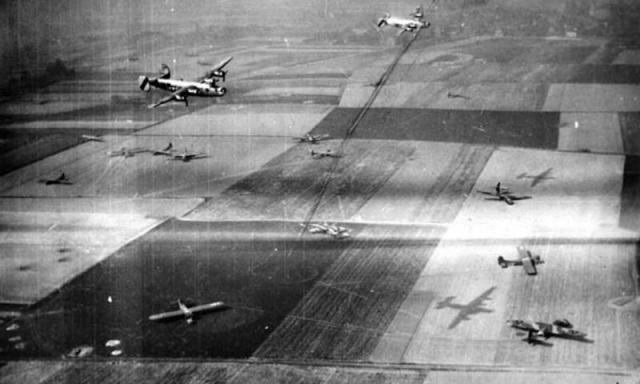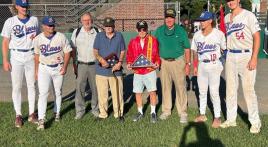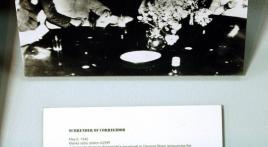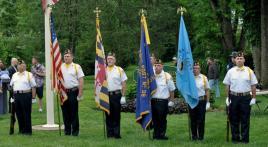December 1944. The Ardennes region of Belgium, France and Luxembourg. The horrid, frigid weather had never been colder. Desperate men, face to face, killing to stay alive. The Battle of the Bulge. Yet when the sun finally shone in January, the Allies began rolling the Germans eastward, winning the war at the Western Front.
In what many historians have called the bloodiest European theater combat of World War II, the Battle of the Bulge began Dec. 16, 1944, and officially ended Jan. 25, 1945. Approximately 500,000 Germans, 600,000 Americans and 55,000 British engaged in the fighting. Adolf Hitler’s objective was to split the 45-mile Allied front in half, encircling them. He hoped this would force a quick stalemate with the Allies, thus allowing the Germans to focus their energies on defeating the Red Army on the Eastern Front.
When the attack commenced, the Allies were caught by surprise for a number of reasons. First, after the tough D-Day invasion – due to their fast, largely unopposed march over the French countryside – they were overconfident and way out front of their supply lines. Next, the Allied command was preoccupied with continuing their push toward the German interior, racing the Russians who were coming from the East, for the prize - capturing Berlin. Finally, horrendously frigid, snowy weather, lack of comm interception due to German radio silence, and grounded recon flights provided no intelligence as to what the Germans were up to.
“Although they didn’t know it at the time, the Allies put themselves at a deadly disadvantage. Their great D-Day victory and overconfidence, combined with unexpected German smarts and courage, almost caused a crushing defeat,” military historian Dan Winters wrote. “Because the Allied combatants were moving so quickly across France, their supply line was not able to keep up. Food, fuel, ammunition and winter clothing were less than scarce. And with that historically fierce winter literally in their face, Allied troops were hunkered down in survival mode when the ‘blitzkrieg’ German offensive roared back at them.”
The deadly weather, while chilling and killing both sides, was still a major advantage for the Germans.
“Our anti-tank weapons were useless,” Franklin Dentz remembered. “When our 2.75 bazookas fired, it might knock off a little metal off a German tank, but no real harm was done. Their tanks way outgunned ours.”
The Battle of the Bulge included many historically important sieges and assaults, including the Battle of St. Vith, as well as operations Greif and Währung, where SS Obersturmbannfuhrer Otto Skorzeny’s English-speaking German assassins and saboteurs infiltrated the Allied lines, plus the horror of the Wereth 11, Chenogne and the infamous Malmedy massacre.
However, no greater battle raged than at Bastogne. On Dec. 19, the Allies lay within the town with the German Panzer and Infantry Corps tightening the overwhelming noose of superior firepower. By Dec. 21, the Germans had Bastogne surrounded, which was defended by elements of a very battered 101st Airborne Division and Combat Command B of the 10th Armored Division.
Just as it appeared that success was in the grasp of the Germans, Dec. 23, 1944, brought dramatically improved weather. And with it came not only huge amounts of supplies, but also much-needed tactical air support and recon, plus an outpouring of replacement and additional American and British troops the front lines so desperately needed.
With several Panzer divisions moving forward, away from Bastogne, only the Panzer Lehr 901st Division was left to assist the 26th Volksgrenadier Division in attempting to take the town. Although their early attacks were successful in penetrating the American line, the force was defeated and all tanks destroyed. On Dec. 26, Gen. George S. Patton’s 4th Armored Division broke through the remaining German lines and opened a vast corridor to Bastogne and beyond, driving Germany’s fate rapidly back to the advancing Russians.
The Battle of the Bulge is rated as the ninth-bloodiest battle of World War II, according to most historians. Total casualties numbered 186,369 men.
Dentz thanks God, his airborne brothers and luck for his having survived the carnage of the Bulge. As a member of the 17th Airborne, he served in a glider squad that took heavy flak during those combat operations in Europe.
In 2013, Dentz described his actions, saying, “I was just a kid, but I wanted to be an airborne guy, a paratrooper. But I ended up in gliders, in many ways a lot more scary than jumping from a C-47.
“Ours were those CG-4A gliders, designed by the Waco Aircraft Company of Troy, Ohio. They were our workhorse of the sky, able to carry a jeep, a 75 mm howitzer, construction equipment or a bunch of us glider-bound paratroopers.”
Dentz and his comrades spent months training to go into battle, carried by what he called “these large airplanes without engines, made of little more than plywood, cotton and steel tubing. Our gliders were towed by C-47s to the target areas before being released and piloted toward their objective, usually under German gunfire.”
After his glider landed in the Ardennes region, Dentz found himself, along with members of the 101st and 82nd Airborne divisions, stopped up in the Bastogne area.
“We were there for five weeks with the highest temperature of 10 degrees above zero … heavy snow and no winter clothing,” said Dentz. “We were 24/7 in shallow, frozen foxholes and fighting. We were young kids and ‘gung ho’ Airborne. But we were also freezing and dying, all while trying to hold off those persistent German attacks.”
In late 2012, during a ceremony honoring Battle of the Bulge veterans at the city hall in Sanibel Island, Fla., Nashville singer/songwriter Joe Sun (a member of Post 92 in Rochester, Minn.) was recognized by civic leader Ted Tyson for performing a song, “It’ll Be a Red, White and Blue Christmas (When All of Our Soldiers Come Home).” Tyson challenged Sun to write an original song about the Battle of the Bulge.
“After the ceremony, while having lunch with the vets,” said Sun, an airman 1st class during the Vietnam War, “I mentioned to Ted that after giving his challenge some thought, there was a minor problem: there is only one word I could think of that rhymed with ‘bulge.’”
It must not have been too much of a challenge, because the song was written and recorded in less than a week. Sun was inspired not only by meeting local veterans at the ceremony, but also by his own family.
“My Uncle George was there in ‘44,” said Sun. “And though he never talked much about those days, after learning the historical facts for the song, it’s easy to understand why.”
Using those veterans and fallen family members as muses, Sun’s song came to being following discussions and ideas tossed at Post 123 in Sanibel. It was recorded at Jimmy Jensen’s Barefoot Studio on Sanibel Island by three Nashville stars – Brent Moyer played bass and lead guitars, Sun did vocals and played rhythm guitar, and Austin Church added percussions. The group debuted the song on the beach along the Gulf of Mexico at the culmination of the January 2013 Captiva Marching Mullet Band Parade.
The weather was delightful as locals and visitors in shorts and T-shirts gathered to enjoy a parade to honor a few of those remaining Battle of the Bulge veterans, most of whom are also American Legion members. As the evening sun set, the parade ended at the beach for an impromptu concert recognizing the contributions of those men, and one local man in particular who survived that frigid December 69 years earlier.
As the sun began to drop in the horizon, the parade got underway with the guest of honor in tow. In a glistening ’67 Cadillac, 88-year-old Sanibel Islander Franklin Dentz, also a member of Post 123, and his wife Arlene joined Sun. Their vehicle led the parade through the streets of Captiva Island, with huge numbers of folks applauding and saluting.
Once at the beach, Rev. Bob Hansel honored all veterans with a speech before introducing Sun, who performed his song “The Battle of the Bulge,” recognizing the courage and survival of men like his uncle and Dentz, and those who did not survive the frigid horrors of more than a half-century ago.
J. David Truby is a member of Post 123 in Sanibel, Fla.
To hear Sun's song "The Battle of the Bulge," go to www.myspace.com/joesunandtheallstars/music/songs?filter=featured.
Visit www.legion.org/honor/photos/225440/battle-bulge-veterans-honored-song to see a gallery of photos from Dentz' time in Europe and the 2013 ceremony.





